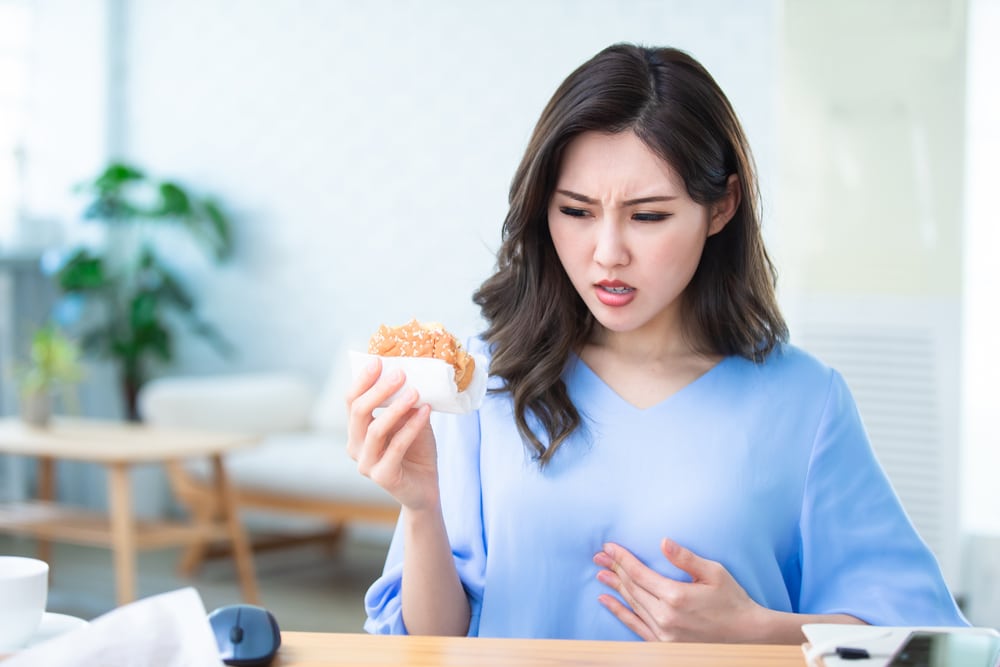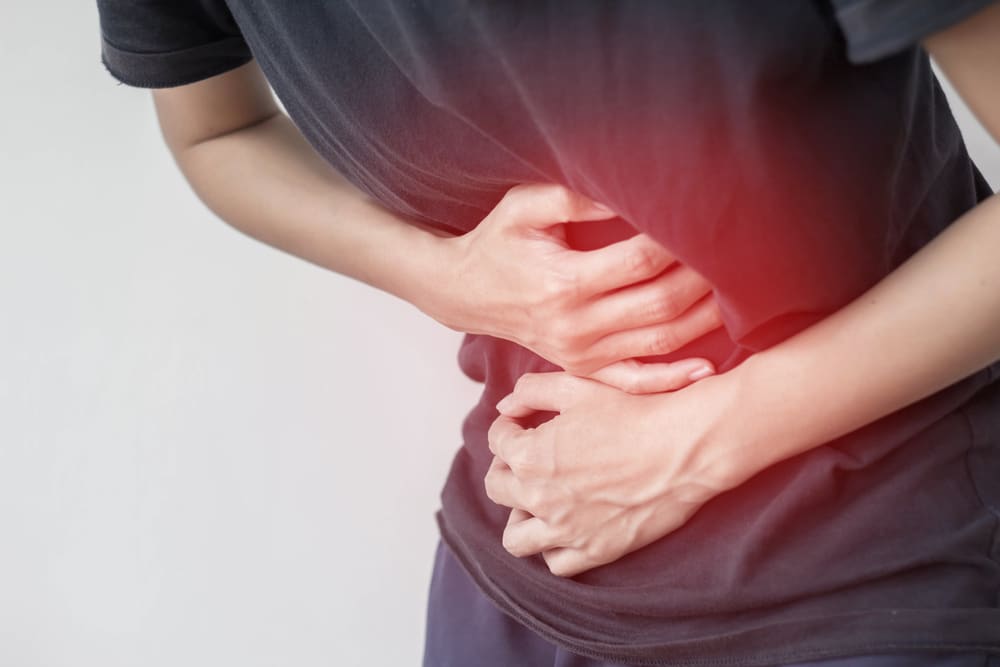Vomiting after eating: What you should know?
Find out why you may be feeling nauseous after eating and what you can do about it.
Vomiting after eating: What you should know?
Find out why you may be feeling nauseous after eating and what you can do about it.
Why do I feel like vomiting after eating?
Sometimes, the feeling of throwing up after eating may simply be due to eating too much and becoming very full, but it may also be a sign of a range of gastrointestinal conditions, such as:

Food intolerances
When a person consumes food items they are intolerant to, they may experience an allergic reaction that causes the immune system to produce immunoglobulin E and histamine—vomiting is a common symptom of an allergic reaction.

Gastro-oesophageal reflux disease
This condition is caused by the lower oesophageal sphincter muscle weakening and being unable to close properly, resulting in stomach contents flowing back into the oesophagus, which may make patients vomit.




Gastroenteritis
Gastroenteritis may be caused by an infection in the stomach, usually involving a virus, like a norovirus. Stomach infections like this may cause patients to experience nausea and vomiting.




Stress and anxiety
While stress and anxiety are psychological conditions, they may sometimes cause people to feel like vomiting after eating. Studies have shown that stress and anxiety could affect how the gastrointestinal tract contracts, which may contribute to nausea.

Food intolerances
When a person consumes food items they are intolerant to, they may experience an allergic reaction that causes the immune system to produce immunoglobulin E and histamine—vomiting is a common symptom of an allergic reaction.




Gastro-oesophageal reflux disease
This condition is caused by the lower oesophageal sphincter muscle weakening and being unable to close properly, resulting in stomach contents flowing back into the oesophagus, which may make patients vomit.




Gastroenteritis
Gastroenteritis may be caused by an infection in the stomach, usually involving a virus, like a norovirus. Stomach infections like this may cause patients to experience nausea and vomiting.




Stress and anxiety
While stress and anxiety are psychological conditions, they may sometimes cause people to feel like vomiting after eating. Studies have shown that stress and anxiety could affect how the gastrointestinal tract contracts, which may contribute to nausea.

Food intolerances
When a person consumes food items they are intolerant to, they may experience an allergic reaction that causes the immune system to produce immunoglobulin E and histamine—vomiting is a common symptom of an allergic reaction.




Gastro-oesophageal reflux disease
This condition is caused by the lower oesophageal sphincter muscle weakening and being unable to close properly, resulting in stomach contents flowing back into the oesophagus, which may make patients vomit.




Gastroenteritis
Gastroenteritis may be caused by an infection in the stomach, usually involving a virus, like a norovirus. Stomach infections like this may cause patients to experience nausea and vomiting.




Stress and anxiety
While stress and anxiety are psychological conditions, they may sometimes cause people to feel like vomiting after eating. Studies have shown that stress and anxiety could affect how the gastrointestinal tract contracts, which may contribute to nausea.
What can I do to prevent vomiting?



Limit your movement
Moving around too much when feeling nauseous can trigger vomiting. So, try to avoid too much movement, especially just after you’ve had a meal. When resting, stay in an upright or seated position and avoid lying on your belly.



Avoid strong smells
Some individuals are very sensitive to strong smells, and even the smell of sweetly scented perfumes may trigger nausea. So, when feeling nauseous, it’s best to avoid any strong smells that you usually find to be unpleasant.



Eat crackers and saltines
Eating saltines and crackers may help keep vomiting at bay. They can help absorb stomach acids that irritate the stomach and cause vomiting. Saltines are high in sodium, so it’s best to be mindful about including them in your daily diet.



Drink sweetened liquids
Drinking clear, sweetened liquids, like fruit juice, could help keep nausea and vomiting at bay. Their sugar content may help calm the stomach. Try to avoid beverages made from grapefruit and oranges because they’re too acidic.



Take OTC medication
Medication, like Pepto-Bismol, may help protect the linings of the stomach and prevent vomiting caused by conditions like food poisoning. Before taking OTC medication, make sure to consult your gastrointestinal specialist.



Try breathing exercises
Take a deep breath, allowing your abdomen to expand, and hold it for about three seconds. Then, slowly breathe out, allowing your abdomen to relax. Repeat this exercise several times until the feeling of nausea begins to subside.
What can I do to prevent vomiting?



Limit your movement
Moving around too much when feeling nauseous can trigger vomiting. So, try to avoid too much movement, especially just after you’ve had a meal. When resting, stay in an upright or seated position and avoid lying on your belly.



Avoid strong smells
Some individuals are very sensitive to strong smells, and even the smell of sweetly scented perfumes may trigger nausea. So, when feeling nauseous, it’s best to avoid any strong smells that you usually find to be unpleasant.



Eat crackers and saltines
Eating saltines and crackers may help keep vomiting at bay. They can help absorb stomach acids that irritate the stomach and cause vomiting. Saltines are high in sodium, so it’s best to be mindful about including them in your daily diet.



Drink sweetened liquids
Drinking clear, sweetened liquids, like fruit juice, could help keep nausea and vomiting at bay. Their sugar content may help calm the stomach. Try to avoid beverages made from grapefruit and oranges because they’re too acidic.



Take OTC medication
Medication, like Pepto-Bismol, may help protect the linings of the stomach and prevent vomiting caused by conditions like food poisoning. Before taking OTC medication, make sure to consult your gastrointestinal specialist.



Try breathing exercises
Take a deep breath, allowing your abdomen to expand, and hold it for about three seconds. Then, slowly breathe out, allowing your abdomen to relax. Repeat this exercise several times until the feeling of nausea begins to subside.
What people say about us
Visit the Sydney Gut Clinic
At the Sydney Gut Clinic, our team of trusted and experienced specialists is dedicated to delivering high-quality care for your gastrointestinal conditions.
If you’re experiencing symptoms like vomiting after eating, get in touch with our team today to receive the support and treatment you need to relieve your symptoms.
FAQ
Could throwing up after eating indicate a serious medical condition?
While vomiting after a meal may not always be a sign of a serious underlying illness, if it continues to happen frequently and is accompanied by other symptoms like severe abdominal pain and fever, a visit to a doctor may be warranted.
Is excessive vomiting harmful?
Yes, it is.
If left untreated, excessive vomiting may lead to dehydration and it could damage the lining of the oesophagus.
How should I sleep in if I feel nauseous?
Try lying down while keeping your body in an elevated position, and avoid sleeping on the right side of your body.
Speak to our trained medical team for support and treatment for nausea and vomiting after eating.
Sydney Gut Clinic services are only available to patients in Australia.










